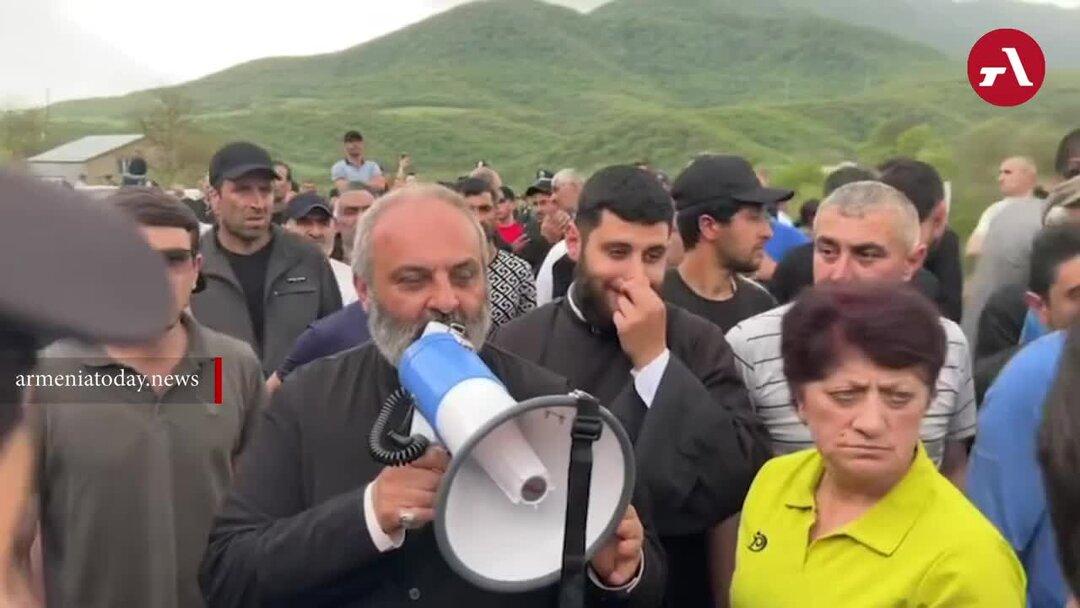Armenia faces internal strife as border agreement with Azerbaijan sparks unrest Tensions rise
Diplomats and politicians from across the world supported the results of the April 19 meeting between the Azerbaijani and Armenian deputy prime ministers. Thus, President of the European Council Charles Michel welcomed the agreement between Armenia and Azerbaijan on the 1991 Alma Ata Declaration as the basis for border delimitation between the two countries. He made a post on his X account regarding this. " Border delimitation based on the unambiguous recognition of the territorial integrity of each country has been a key element also of discussions in Brussels and will serve as an essential step towards normalisation and the peaceful opening of the entire region," Michel posted.
This refers to the agreements reached as a result of the April 19, 2024 meeting of the commissions on the border delimitation between Azerbaijan and Armenia. According to these agreements, the villages of Baganis, Kheyrimli, Ashaghi Askipara and Gizilhajili are fully returned to Azerbaijani control. This is fair and gives some hope, albeit ghostly, that the neighbors finally come to their senses and begin to understand that it is not good to take someone else's property, and if you have taken it, it must be returned.
Unfortunately, this understanding is not peculiar to everyone. For example, in the Tavush (Tovuzgala) region of Armenia, riots have started, which are fueled by revanchists. As a result of the scuffle in Bagratashen (Lamballe), Garnik Danielyan, a member of parliament from Kocharyan's Armenia faction, received light injuries. "As a result of the authorities' provocation, a scuffle took place in Bagratashen section, where Tavush residents blocked the road" - this is how Kristine Vardanyan, MP from the same faction, assessed the situation. In her opinion, "the agreement on delimitation is a provocation of the Armenian authorities". In general, there is a tactical alliance between revanchists, the opposition and a part of the Armenian Apostolic Church against the ruling Civil Contract party in Armenia.

On April 21, protesters blocked the road on the Ashaghi Askipara - Kheyrimli section of the M6 highway. This road is of interstate importance and connects Armenia with Georgia. And today the primate of the AAC's Tavush Diocese, Archbishop Bagrat Galstanyan, said the following: "All this movement is in the name of God, in the name of Motherland, in the name of justice and truth", after which he addressed the cultural figures of Armenia with the words: "You are obliged to present your position today. This is simply a catastrophe. Today we are fighting for the truth. Until now, the nation has been alone, and today is the time to change that." Well, the clergyman, of course, has every right to address both the society as a whole and a certain part of it, but the Archbishop's words, with which he addressed the Armenian military, both current and former, should make the Armenian authorities wary: "Your uniform is your honor, which we respect. It is the homeland and the state you are defending. Say something, show something. The Armenian military, especially the former ones, cannot remain silent. Tomorrow it will be the turn of Tigranashen (Karki - Ed.). Our state will become a memory and a dream". Am I the only one who sees in these words a call for the violent overthrow of power through a military coup?
So, if I were the relevant Armenian authorities, I would take a closer look at the Archbishop, or you know, just in case. The Armenian Church has extensive connections, and personally I would not be surprised by anything. Not even an attempted military coup. Besides, his eminence has already openly stated that he considers himself a revanchist and "will live like that until the last second of his life".
Another thing is also indicative: in his interview with Sputnik Armenia, he stated the following: "Voskepar is no longer just a geographical territory, it is a symbol. And it has a good name – “Golden Dance” (this is a translation of the village's name from Armenian). We had the "Wedding in the Mountains" (the operation to occupy Shusha in 1992), and now we have the "Golden Dance", let it be the harbinger of our complete liberation, the return of the dream and the homeland of our heroes." Out of respect for the sanctuary, I will refrain from recalling exactly how that wedding in 2020 ended, but I don't mind dancing at all, especially remembering how some people danced in the then occupied Shusha and what happened after that. And "Golden Dance" is no longer "Golden Dance", there is no "Golden Dance" anymore, but there is the Azerbaijani village of Ashaghi Askipara, and that is forever. Make conclusions: you are unlucky when you start dancing, and the map is not good, and the political map is changing.
By and large, the conflict between the Armenian authorities and part of the Armenian society is their internal affair, and we are not going to interfere in it, if only because the issue has already been resolved: Armenia has already signed the protocol on the return of the four villages, and there is absolutely nowhere for it to escape from the signed document, especially since this decision was recorded by all of Yerevan's allies, and its Western allies even welcomed this decision. And the authorities in Armenia are ahead of the curve and trying to resist the revanchists, realizing perfectly well that any attempt at revenge may lead to the complete loss of Armenian statehood. Well, all right then, behave yourselves.








